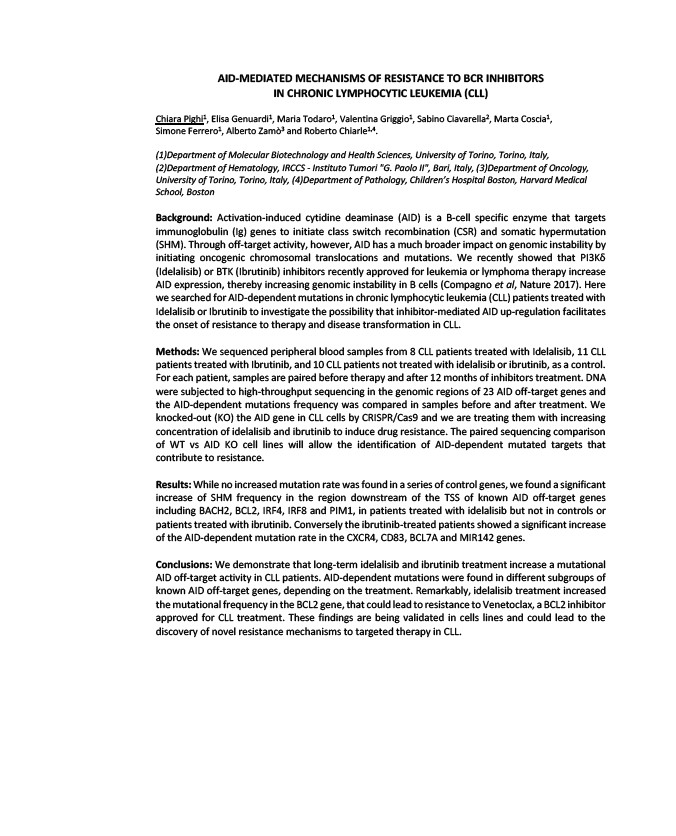
AID-MEDIATED MECHANISMS OF RESISTANCE TO BCR INHIBITORS
IN CHRONIC LYMPHOCYTIC LEUKEMIA (CLL)
Chiara Pighi1, Elisa Genuardi1, Maria Todaro1, Valentina Griggio1, Sabino Ciavarella2, Marta Coscia1,
Simone Ferrero1, Alberto Zamò3 and Roberto Chiarle1,4.
(1)Department of Molecular Biotechnology and Health Sciences, University of Torino, Torino, Italy,
(2)Department of Hematology, IRCCS - Instituto Tumori "G. Paolo II", Bari, Italy, (3)Department of Oncology,
University of Torino, Torino, Italy, (4)Department of Pathology, Children’s Hospital Boston, Harvard Medical
School, Boston
Background: Activation-induced cytidine deaminase (AID) is a B-cell specific enzyme that targets
immunoglobulin (Ig) genes to initiate class switch recombination (CSR) and somatic hypermutation
(SHM). Through off-target activity, however, AID has a much broader impact on genomic instability by
initiating oncogenic chromosomal translocations and mutations. We recently showed that PI3Kδ
(Idelalisib) or BTK (Ibrutinib) inhibitors recently approved for leukemia or lymphoma therapy increase
AID expression, thereby increasing genomic instability in B cells (Compagno et al, Nature 2017). Here
we searched for AID-dependent mutations in chronic lymphocytic leukemia (CLL) patients treated with
Idelalisib or Ibrutinib to investigate the possibility that inhibitor-mediated AID up-regulation facilitates
the onset of resistance to therapy and disease transformation in CLL.
Methods: We sequenced peripheral blood samples from 8 CLL patients treated with Idelalisib, 11 CLL
patients treated with Ibrutinib, and 10 CLL patients not treated with idelalisib or ibrutinib, as a control.
For each patient, samples are paired before therapy and after 12 months of inhibitors treatment. DNA
were subjected to high-throughput sequencing in the genomic regions of 23 AID off-target genes and
the AID-dependent mutations frequency was compared in samples before and after treatment. We
knocked-out (KO) the AID gene in CLL cells by CRISPR/Cas9 and we are treating them with increasing
concentration of idelalisib and ibrutinib to induce drug resistance. The paired sequencing comparison
of WT vs AID KO cell lines will allow the identification of AID-dependent mutated targets that
contribute to resistance.
Results: While no increased mutation rate was found in a series of control genes, we found a significant
increase of SHM frequency in the region downstream of the TSS of known AID off-target genes
including BACH2, BCL2, IRF4, IRF8 and PIM1, in patients treated with idelalisib but not in controls or
patients treated with ibrutinib. Conversely the ibrutinib-treated patients showed a significant increase
of the AID-dependent mutation rate in the CXCR4, CD83, BCL7A and MIR142 genes.
Conclusions: We demonstrate that long-term idelalisib and ibrutinib treatment increase a mutational
AID off-target activity in CLL patients. AID-dependent mutations were found in different subgroups of
known AID off-target genes, depending on the treatment. Remarkably, idelalisib treatment increased
the mutational frequency in the BCL2 gene, that could lead to resistance to Venetoclax, a BCL2 inhibitor
approved for CLL treatment. These findings are being validated in cells lines and could lead to the
discovery of novel resistance mechanisms to targeted therapy in CLL.